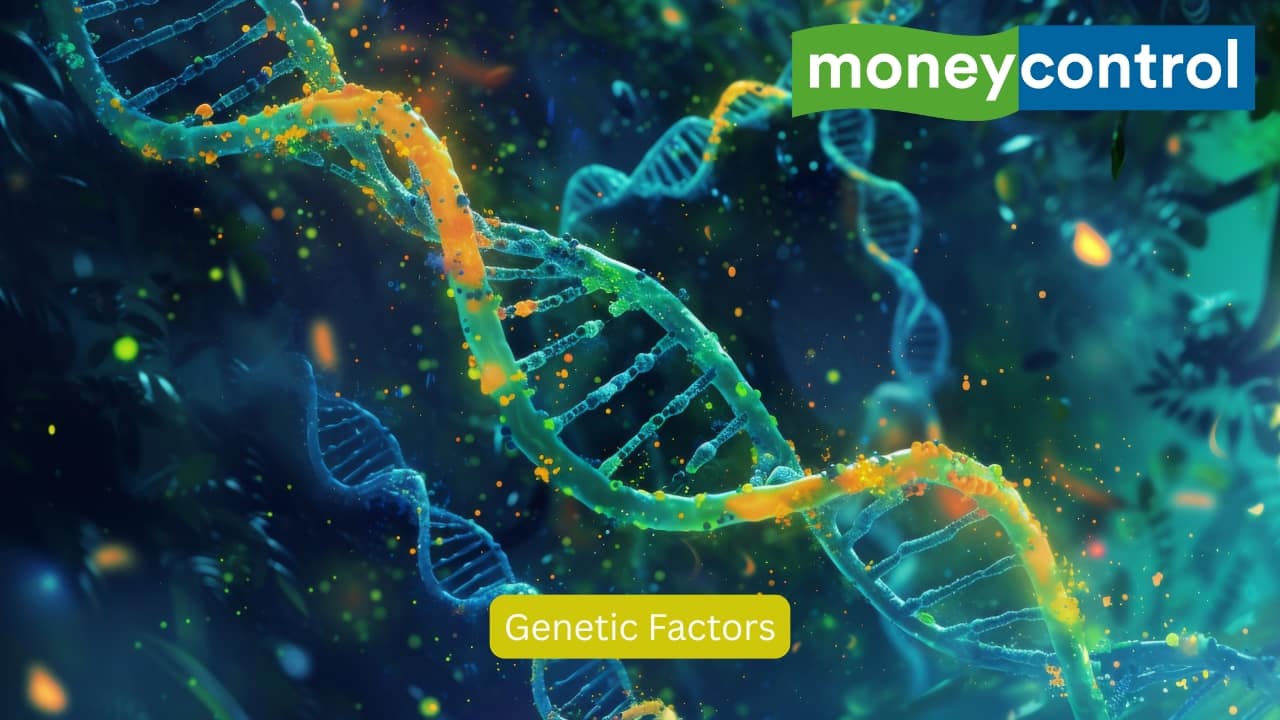9 common health reasons behind hair fall and how to control it naturally
Hair loss is rarely random — it’s usually a symptom of an underlying issue. Pinpointing the cause through medical consultation and adopting natural lifestyle tweaks can make a huge difference. From balanced nutrition and stress reduction to proper hair care and treating medical conditions, you can restore your hair’s strength, shine, and growth. Don’t ignore the signs — healthy hair starts with understanding your body.
1/10

Hair Fall Isn’t Just Cosmetic
Hair loss is often dismissed as a simple beauty issue, but it can actually signal deeper health concerns. From nutrient shortages to chronic stress and hormonal imbalances, many underlying factors affect hair growth. Understanding the root cause is key to finding effective, natural solutions that restore your hair’s health and your confidence.(Image: Canva)
Hair loss is often dismissed as a simple beauty issue, but it can actually signal deeper health concerns. From nutrient shortages to chronic stress and hormonal imbalances, many underlying factors affect hair growth. Understanding the root cause is key to finding effective, natural solutions that restore your hair’s health and your confidence.(Image: Canva)
2/10

When Hormones Go Off Track
Hormones play a vital role in maintaining hair growth cycles. Conditions such as Polycystic Ovary Syndrome (PCOS), thyroid disorders, and menopause can disrupt this delicate balance, causing hair to thin or fall out more rapidly. For example, thyroid hormone imbalances can slow down hair follicle regeneration, leading to thinning patches. A simple blood test can help detect these hormonal issues. Working with your doctor to manage hormone levels through medication or lifestyle changes can greatly improve hair health.(Image: Canva)
Hormones play a vital role in maintaining hair growth cycles. Conditions such as Polycystic Ovary Syndrome (PCOS), thyroid disorders, and menopause can disrupt this delicate balance, causing hair to thin or fall out more rapidly. For example, thyroid hormone imbalances can slow down hair follicle regeneration, leading to thinning patches. A simple blood test can help detect these hormonal issues. Working with your doctor to manage hormone levels through medication or lifestyle changes can greatly improve hair health.(Image: Canva)
3/10

Nutritional Deficiencies
Your hair depends on essential nutrients to grow strong and healthy. Deficiencies in iron, vitamin D, zinc, and protein are among the most common culprits behind hair loss. Iron deficiency, for example, limits oxygen supply to hair follicles, weakening them. Incorporating nutrient-rich foods like leafy greens, nuts, seeds, eggs, and fatty fish into your diet can help nourish your scalp and follicles from within. If your diet falls short, supplements may be recommended—but only under medical supervision to avoid excess intake.(Image: Canva)
Your hair depends on essential nutrients to grow strong and healthy. Deficiencies in iron, vitamin D, zinc, and protein are among the most common culprits behind hair loss. Iron deficiency, for example, limits oxygen supply to hair follicles, weakening them. Incorporating nutrient-rich foods like leafy greens, nuts, seeds, eggs, and fatty fish into your diet can help nourish your scalp and follicles from within. If your diet falls short, supplements may be recommended—but only under medical supervision to avoid excess intake.(Image: Canva)
4/10

Chronic Stress
Stress is not just a mental burden; it physically impacts your body — including your hair. Chronic emotional or physical stress forces hair follicles into a resting phase called telogen, which results in excessive shedding weeks or months later. This process is called telogen effluvium and can be reversed once stress is managed. Regular relaxation techniques such as meditation, yoga, deep breathing exercises, or even simple daily walks can calm your nervous system and reduce hair fall caused by stress.(Image: Canva)
Stress is not just a mental burden; it physically impacts your body — including your hair. Chronic emotional or physical stress forces hair follicles into a resting phase called telogen, which results in excessive shedding weeks or months later. This process is called telogen effluvium and can be reversed once stress is managed. Regular relaxation techniques such as meditation, yoga, deep breathing exercises, or even simple daily walks can calm your nervous system and reduce hair fall caused by stress.(Image: Canva)
5/10

Healthy Scalp is Healthy Hair
A healthy scalp is the foundation for healthy hair. Fungal infections like ringworm can inflame and damage hair follicles, disrupting the natural hair growth cycle. Signs include itching, redness, flaking, or bald patches. If you notice any of these symptoms, it’s important to visit a dermatologist promptly. Prescription antifungal medications or medicated shampoos can effectively clear infections and restore scalp health, allowing hair to grow back strong.(Image: Canva)
A healthy scalp is the foundation for healthy hair. Fungal infections like ringworm can inflame and damage hair follicles, disrupting the natural hair growth cycle. Signs include itching, redness, flaking, or bald patches. If you notice any of these symptoms, it’s important to visit a dermatologist promptly. Prescription antifungal medications or medicated shampoos can effectively clear infections and restore scalp health, allowing hair to grow back strong.(Image: Canva)
6/10

Certain Medications Can Be Causing Hair Loss
Some medications, though necessary for managing health conditions, can have hair loss as a side effect. Common examples include certain blood pressure drugs, chemotherapy agents, and antidepressants. This hair loss is usually temporary and reversible once the medication is stopped or adjusted. If you suspect your medicine is affecting your hair, talk to your doctor. They may suggest alternative treatments or ways to manage this side effect without compromising your overall health.(Image: Canva)
Some medications, though necessary for managing health conditions, can have hair loss as a side effect. Common examples include certain blood pressure drugs, chemotherapy agents, and antidepressants. This hair loss is usually temporary and reversible once the medication is stopped or adjusted. If you suspect your medicine is affecting your hair, talk to your doctor. They may suggest alternative treatments or ways to manage this side effect without compromising your overall health.(Image: Canva)
7/10

Autoimmune Conditions and Effects on Hair Follicles
In autoimmune diseases such as alopecia areata, the immune system mistakenly attacks hair follicles, causing patchy or widespread hair loss. While there is currently no cure, treatments like corticosteroid injections, topical immunotherapy, and other immune-modulating therapies can help manage flare-ups and encourage hair regrowth. Supportive care and early intervention are important to control symptoms and improve quality of life.(Image: Canva)
In autoimmune diseases such as alopecia areata, the immune system mistakenly attacks hair follicles, causing patchy or widespread hair loss. While there is currently no cure, treatments like corticosteroid injections, topical immunotherapy, and other immune-modulating therapies can help manage flare-ups and encourage hair regrowth. Supportive care and early intervention are important to control symptoms and improve quality of life.(Image: Canva)
8/10

Poor Hair Care Practices
How you treat your hair daily can either strengthen it or lead to damage and loss. Excessive heat styling, tight ponytails or buns, harsh chemical treatments, and rough handling pull on hair shafts and roots, causing breakage and traction alopecia. Switching to gentler styling methods, avoiding heat when possible, and using nourishing products like oils or leave-in conditioners can protect hair from damage and promote healthier growth.(Image: Canva)
How you treat your hair daily can either strengthen it or lead to damage and loss. Excessive heat styling, tight ponytails or buns, harsh chemical treatments, and rough handling pull on hair shafts and roots, causing breakage and traction alopecia. Switching to gentler styling methods, avoiding heat when possible, and using nourishing products like oils or leave-in conditioners can protect hair from damage and promote healthier growth.(Image: Canva)
9/10

Chronic Illnesses
Certain chronic health problems such as diabetes, liver disease, or autoimmune disorders can interfere with hair growth. For instance, uncontrolled diabetes affects circulation and nutrient delivery to hair follicles, leading to thinning. Managing the underlying illness with proper medical care often results in hair regrowth once the body’s overall health improves. Regular checkups and coordinated care are vital in these cases.(Image: Canva)
Certain chronic health problems such as diabetes, liver disease, or autoimmune disorders can interfere with hair growth. For instance, uncontrolled diabetes affects circulation and nutrient delivery to hair follicles, leading to thinning. Managing the underlying illness with proper medical care often results in hair regrowth once the body’s overall health improves. Regular checkups and coordinated care are vital in these cases.(Image: Canva)
10/10

Genetic Factors
Genetics plays a huge role in male and female pattern baldness, which typically causes gradual thinning at the crown or hairline. While you can’t change your genes, early diagnosis and treatment can slow progression. Medications like minoxidil or finasteride, along with lifestyle adjustments and a healthy diet, help maintain existing hair and encourage regrowth. Consult a dermatologist or trichologist to tailor a treatment plan specific to your genetic predisposition.(Image: Canva)
Genetics plays a huge role in male and female pattern baldness, which typically causes gradual thinning at the crown or hairline. While you can’t change your genes, early diagnosis and treatment can slow progression. Medications like minoxidil or finasteride, along with lifestyle adjustments and a healthy diet, help maintain existing hair and encourage regrowth. Consult a dermatologist or trichologist to tailor a treatment plan specific to your genetic predisposition.(Image: Canva)
Discover the latest Business News, Budget 2025 News, Sensex, and Nifty updates. Obtain Personal Finance insights, tax queries, and expert opinions on Moneycontrol or download the Moneycontrol App to stay updated!






